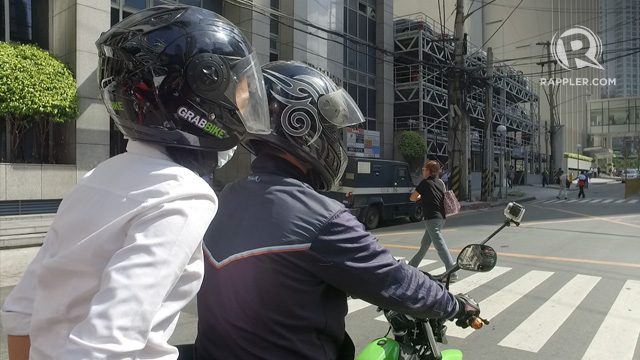SUMMARY
This is AI generated summarization, which may have errors. For context, always refer to the full article.

MANILA, Philippines – Despite an order from the Land Transportation Franchising and Regulatory Board (LTFRB), ride-hailing service GrabBike is still continuing its operations because the cease and desist order had been sent to the wrong entity.
In a hearing of the House committee on transportation on Wednesday, February 3, Grab’s vice president for public affairs Nina Teng said the LTFRB letter dated January 21 was addressed to MyTaxi.PH, which offers transport network vehicle services (TNVS) GrabTaxi and GrabCar.
But the motorcycle ride-hailing service is being operated by a separate company – Grab Bike Incorporated – even though it also uses the same app-based platform.
“We are still operating GrabBike as we speak. The cease and desist letter was sent to the wrong entity….Once the GrabBike entity receives the cease and desist, we will honor that,” Teng said.
Last week, the LTFRB ordered the suspension of the GrabBike service, saying MyTaxi.PH has not been accredited to offer the use of motorcycles or bikes as part of its business model. (READ: Could this be GrabBike’s last ride in the Philippines?)
“We will have no option but to cancel MYTAXI.PH’s accreditation if they continue to offer motorcycle transport service which is not part of its business model and not what the Board had envisioned for TNCs and TNVS,” LTFRB Chairman Winston Ginez said in a statement.
During the House hearing, Teng said the GrabBike service aims to address a strong demand from commuters for a faster and more efficient form of transport, given Metro Manila’s hours-long traffic jams.
She said that most GrabBike passengers take the service when they are in a hurry, or if they only need to travel shorter distances, such as transferring from the train station to a bus stop.
Teng also said that around 2.6 million motorcycle drivers stand to gain from the employment opportunities provided by the company.
But committee chairman Catanduanes Representative Cesar Sarmiento said that with the absence of approval from the LTFRB, GrabBike should cease operations because it is still operating illegally as a public utility vehicle.
“If you are transporting passengers from one point to another, then you are a public utility vehicle. And if you are a public utility vehicle, you must secure an authority coming from the LTFRB. In the absence of an authority from the LTFRB, you are a ‘colorum’ [vehicle],” Sarmiento said.
While Teng said the company would comply once it receives the cease and desist letter, she also said Grab would like to work with transport authorities to craft regulations specifically for the motorcycle service, similar to what it did when the transportation department laid out rules for new transport categories covering the ride-hailing services.
“We also want to offer a solution to the government….If you take the case of GrabCar, it wasn’t regulated at first. Now it is. When it first began, it really was a service for the people, just like GrabBike,” Teng said.
She added that the GrabBike service, which operates much like the local habal-habal, aims to create a safer, more regulated form of motorcycle-based public transport.
“If you’re going to have habal-habal in Metro Manila anyway, and it’s unsafe and operating illegally, and there’s a solution to make it safer and to regulate it with the government, we’re very open to explore that option,” Teng said. – Rappler.com
Add a comment
How does this make you feel?
There are no comments yet. Add your comment to start the conversation.